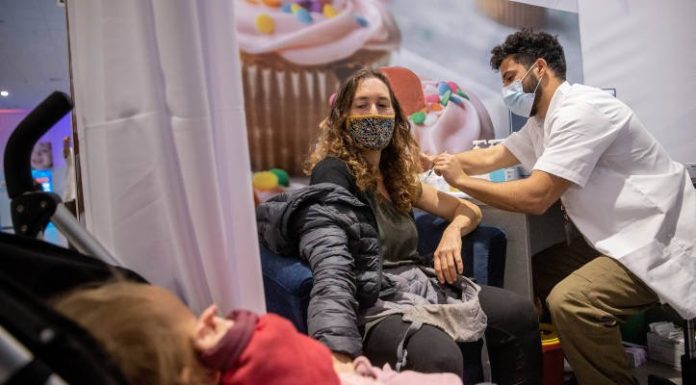

Israel hits 2 million vaccinations. Researchers find a 33% reduction
in the spread of the coronavirus 14 days after the first injections.
Tens of thousands of Israelis are lining up for their second shot of the Pfizer coronavirus vaccine. New research by the Clalit health maintenance organization shows that among 200,000 people 60 and over there was a 33% reduction in the spread of the virus 14 days after the first of the two shots – whether or not they got the shot, Ynet reported.
The research showed that the vaccine protects those who got the vaccination not only from contracting the coronavirus, but also prevents those who are immune from spreading the disease to others, should they still be carrying the virus.
That development is a huge validation of the vaccine, because researchers simply didn’t know whether it would help prevent those who had received it from being carriers of the virus.
As of Thursday, two million Israelis have received the first of two Pfizer COVID vaccine shots, and over 110,000 people have already received their second shot, three weeks after the first. Full protection is due two weeks after the second vaccination.
The clinical research, by Clalit, the largest of Israel’s four HMOs, shows a significant drop in infections among a study group of 200,000 people 60 and over, two weeks after the first shots.
A key feature of the research project was that not all of the 200,000 people in the study received the vaccination, allowing Clalit’s research team to verify the effectiveness of the vaccination program with a representation of the general population.
For the first shot recipients, there was no visible effect on general infection rates for the days, said Prof. Ran Balicer, head of innovation at Clalit.
The data showed just a slight fall in morbidity on day 13. But by the 14th day after the first vaccination there was a 33% drop in the spread of the disease from those who were vaccinated to people who were not – indicating that antibodies had kicked in by then.
Israel’s vaccination campaign began Dec. 20 and is the largest controlled population in the world to get the vaccine. In a deal struck with Pfizer by Prime Minister Benjamin Netanyahu and Israeli health officials, the drug company agreed to advance millions of doses of their vaccine to Israel. In return, Israel would share the data and results with both Pfizer and the World Health Organization.
Using Israel as a “living laboratory”, Pfizer and health officials will use the data to find the best way of rolling out vaccinations in other countries.
So far the Israeli health experts believe that the data shows a significant drop in the spread of the virus. Prof. Balicer said that although the results are only preliminary, they are “very encouraging.”
“It is important to bear in mind that these results do not show that there is full protection from the disease,” Balicer told Ynet. “Therefore, those who have been vaccinated must still be cautious, wear a face mask and adhere to public health orders” in order to protect those around them, he cautioned.
(United with Israel).





